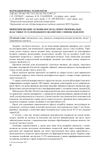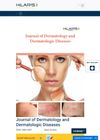
Anionic surfactants significantly improve the foaming of minoxidil gel shampoo.
 April 2014 in “Journal of evolution of medical and dental sciences”
April 2014 in “Journal of evolution of medical and dental sciences” Women over forty can maintain skin and hair health with lifestyle and dietary changes.
 April 2014 in “Journal of Aesthetic Nursing”
April 2014 in “Journal of Aesthetic Nursing” Mesotherapy with natural extracts and vitamins can improve hair loss and promote regrowth in most women.
 January 2012 in “Human health handbooks”
January 2012 in “Human health handbooks” Traditional Indian remedies are used for hair health, but more scientific evidence is needed to prove their safety and effectiveness.
 January 2017 in “Journal of cosmetology & trichology”
January 2017 in “Journal of cosmetology & trichology” Polydioxanone threads can effectively reduce hair loss and increase hair re-growth in patients with androgenetic alopecia, providing a quick and relatively painless treatment option.
 March 2007 in “Faculty Opinions – Post-Publication Peer Review of the Biomedical Literature”
March 2007 in “Faculty Opinions – Post-Publication Peer Review of the Biomedical Literature” Dutasteride helps reduce male pattern hair loss, but may cause side effects like altered libido and erectile dysfunction.
 March 2020 in “Faculty Opinions – Post-Publication Peer Review of the Biomedical Literature”
March 2020 in “Faculty Opinions – Post-Publication Peer Review of the Biomedical Literature” Combining nonablative fractional laser with minoxidil was effective for alopecia areata with only one patient relapsing after a year.
December 2021 in “Faculty Opinions – Post-Publication Peer Review of the Biomedical Literature”  October 2017 in “World Academy of Science, Engineering and Technology, International Journal of Medical and Health Sciences”
October 2017 in “World Academy of Science, Engineering and Technology, International Journal of Medical and Health Sciences” Combination therapy with higher concentrations of minoxidil can lead to rapid hair growth in pattern baldness with no significant side effects.
 October 2023 in “Faculty Opinions – Post-Publication Peer Review of the Biomedical Literature”
October 2023 in “Faculty Opinions – Post-Publication Peer Review of the Biomedical Literature” Using both minoxidil and finasteride together on the scalp works better for male hair loss than using either one alone.
 December 2024 in “Archiv Euromedica”
December 2024 in “Archiv Euromedica” Trichoscopy is essential for diagnosing and treating autoimmune cicatricial alopecia early.
 August 2024 in “Pakistan Journal of Health Sciences”
August 2024 in “Pakistan Journal of Health Sciences” PRP with finasteride is better for hair regrowth than minoxidil with finasteride.
May 2013 in “CRC Press eBooks” Electrolysis and laser treatments offer more permanent hair removal, but have limitations.
23 citations,
January 2016 in “International Journal of Trichology” Women with female pattern hair loss have lower Vitamin D3 levels.
14 citations,
January 2016 in “International Journal of Trichology” Many women with hair loss also have thyroid issues, high blood pressure, and low Vitamin D.
12 citations,
January 2019 in “International Journal of Trichology” Trichoscopy is useful for detecting and monitoring androgenetic alopecia.
1 citations,
January 2023 in “Skin Appendage Disorders” Radiofrequency devices can help remove or grow hair, but more research is needed.
 48 citations,
January 2017 in “International Journal of Trichology”
48 citations,
January 2017 in “International Journal of Trichology” Microneedling with platelet-rich plasma and minoxidil improves hair growth more than just minoxidil in men with hair loss.
 31 citations,
July 2017 in “Stem cell investigation”
31 citations,
July 2017 in “Stem cell investigation” Platelet-rich plasma (PRP) is a simple, cost-effective treatment that promotes hair growth and reduces hair loss, with high patient satisfaction.
18 citations,
January 2019 in “International Journal of Trichology” PRP therapy works better than minoxidil for treating hair loss.
11 citations,
January 2019 in “International Journal of Trichology” Mesotherapy is not significantly better than minoxidil for treating male hair loss.
 3 citations,
January 2019 in “PubMed”
3 citations,
January 2019 in “PubMed” Platelet-rich plasma may be effective for genital rejuvenation and deserves more research.
2 citations,
January 2013 in “Journal of cosmetics, dermatological sciences and applications” Using a special shampoo and scalp tonic together can greatly reduce severe dandruff and its causes.
1 citations,
January 2023 in “International journal of medical science and clinical research studies” Treating stubborn hair loss involves both medical and emotional support options.
 December 2024 in “Research Journal of Pharmaceutical Dosage Forms and Technology”
December 2024 in “Research Journal of Pharmaceutical Dosage Forms and Technology” The hair oil may effectively treat common hair problems with fewer side effects.
 November 2015 in “Hair transplant forum international”
November 2015 in “Hair transplant forum international” Hair restoration surgery can cause muscle and joint problems due to poor workplace setup.
 November 2009 in “Cambridge University Press eBooks”
November 2009 in “Cambridge University Press eBooks” The document's conclusion cannot be provided because the content is not accessible.
 December 2024 in “IntechOpen eBooks”
December 2024 in “IntechOpen eBooks” Trichoscopy helps diagnose and track alopecia areata by examining specific hair and scalp markers.

Regular checks and knowing what causes hair loss can help find it early.
 December 2023 in “European Journal of Psychology Open”
December 2023 in “European Journal of Psychology Open” Men who are perfectionists feel more upset about baldness, partly due to aging anxiety.




















